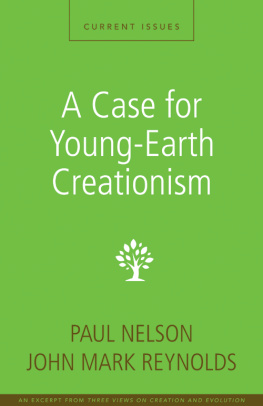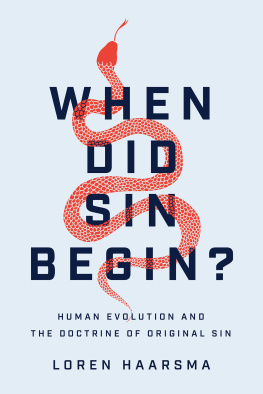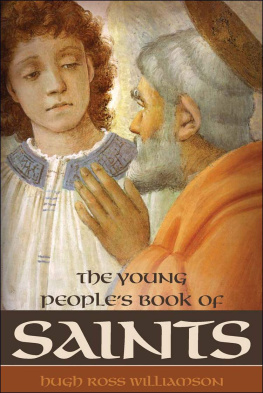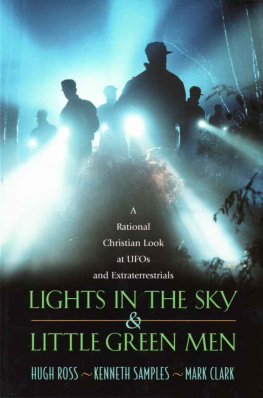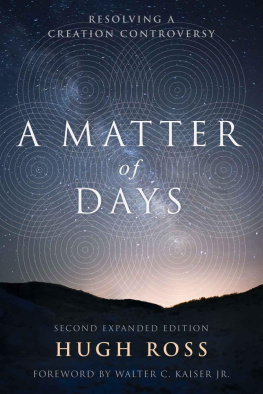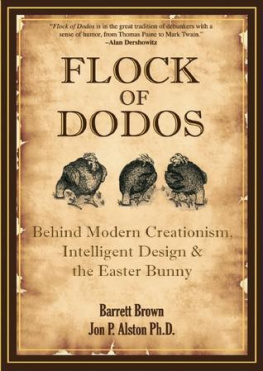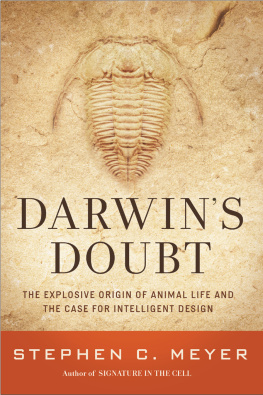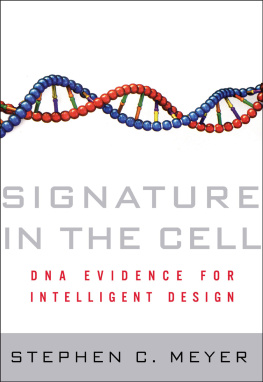ZONDERVAN
Four Views on Creation, Evolution, and Intelligent Design
Copyright 2017 by Ken Ham, Hugh Ross, Deborah B. Haarsma, Stephen C. Meyer, J. B. Stump
Requests for information should be addressed to:
Zondervan, 3900 Sparks Dr. SE, Grand Rapids, Michigan 49546
ePub Edition October 2017: ISBN 978-0-310-08098-5
All Scripture quotations, unless otherwise indicated, are taken from The Holy Bible, New International Version, NIV. Copyright 1973, 1978, 1984, 2011 by Biblica, Inc. Used by permission of Zondervan. All rights reserved worldwide. www.Zondervan.com. The NIV and New International Version are trademarks registered in the United States Patent and Trademark Office by Biblica, Inc.
Scripture quotations marked ESV are from the ESV Bible (The Holy Bible, English Standard Version). Copyright 2001 by Crossway, a publishing ministry of Good News Publishers. Used by permission. All rights reserved.
Scripture quotations marked KJV are taken from the King James Version. Public domain.
Scripture quotations marked NASB are taken from the New American Standard Bible. Copyright 1960, 1962, 1963, 1968, 1971, 1972, 1973, 1975, 1977, 1995 by The Lockman Foundation. Used by permission. (www.Lockman.org).
Scripture quotations marked NLT are taken from the Holy Bible, New Living Translation. 1996, 2004, 2007, 2013, 2015 by Tyndale House Foundation. Used by permission of Tyndale House Publishers, Inc., Carol Stream, Illinois 60188. All rights reserved.
The Scripture quotations marked NRSV are taken from the New Revised Standard Version Bible. Copyright 1989 National Council of the Churches of Christ in the United States of America. Used by permission. All rights reserved.
Any Internet addresses (websites, blogs, etc.) and telephone numbers in this book are offered as a resource. They are not intended in any way to be or imply an endorsement by Zondervan, nor does Zondervan vouch for the content of these sites and numbers for the life of this book.
All rights reserved. No part of this publication may be reproduced, stored in a retrieval system, or transmitted in any form or by any meanselectronic, mechanical, photocopy, recording, or any otherexcept for brief quotations in printed reviews, without the prior permission of the publisher.
Cover design: Tammy Johnson
Cover photo: iStock.com
17 18 19 20 21 22 23 24 25 26 27 /DHV/ 15 14 13 12 11 10 9 8 7 6 5 4 3 2 1
Information about External Hyperlinks in this ebook
Please note that footnotes in this ebook may contain hyperlinks to external websites as part of bibliographic citations. These hyperlinks have not been activated by the publisher, who cannot verify the accuracy of these links beyond the date of publication.
Ken Ham is the president/CEO and founder of Answers in GenesisUS and the highly acclaimed Creation Museum. Ham is one of the most in-demand Christian speakers in North America. His emphasis is on the relevance and authority of the book of Genesis and how compromise on Genesis has opened a dangerous door regarding how modern culture and the church view biblical authority. His Australian accent, keen sense of humor, captivating stories, and exceptional PowerPoint illustrations have made him one of North Americas most effective Christian communicators.
Hugh Ross (PhD, University of Toronto) is founder and president of Reasons To Believe (www.reasons.org). He is the author of many books, including More Than a Theory, Why the Universe Is the Way It Is, and Improbable Planet. An astronomer, Ross has addressed students and faculty on over three hundred campuses in the United States and abroad on a wide variety of science-faith topics. From science conferences to churches to government labs, Ross presents powerful evidence for a purpose-filled universe. He lives in the Los Angeles area.
Deborah B. Haarsma (PhD, MIT) has served as the President of BioLogos since 2013. Previously, she served as professor and chair in the Department of Physics and Astronomy at Calvin College in Grand Rapids, Michigan. Haarsma is an experienced research scientist, with several publications in the Astrophysical Journal and the Astronomical Journal on extragalactic astronomy and cosmology. She is co-author (with her husband Loren Haarsma) of Origins: Christian Perspectives on Creation, Evolution, and Intelligent Design and co-editor (with Rev. Scott Hoezee) of Delight in Creation: Scientists Share Their Work with the Church. Gifted in interpreting complex scientific topics for lay audiences, Haarsma often speaks to churches, colleges, and schools about the relationships between science and Christian faith.
Stephen C. Meyer is Senior Fellow of the Discovery Institute. He received his PhD in the philosophy of science from the University of Cambridge. A former geophysicist and college professor, he now directs Discovery Institutes Center for Science and Culture in Seattle. He has authored the New York Times bestseller Darwins Doubt: The Explosive Origin of Animal Life and the Case for Intelligent Design (HarperOne, 2013) as well as Signature in the Cell: DNA and the Evidence for Intelligent Design (HarperOne, 2009), which was named Book of the Year by the Times (of London) Literary Supplement in 2009.
J. B. Stump (PhD, Boston University) is Senior Editor at BioLogos, where he oversees the development of new content and curates existing content for the website and print materials. He has authored Science and Christianity: An Introduction to the Issues (Wiley-Blackwell, 2017) and co-authored (with Chad Meister) Christian Thought: A Historical Introduction (Routledge, 2010). He has co-edited (with Alan Padgett) The Blackwell Companion to Science and Christianity (Wiley-Blackwell, 2012) and (with Kathryn Applegate) How I Changed My Mind About Evolution (InterVarsity, 2016).
T here are many substantial topics on which Christians hold different views: eternal security, eschatology, election, egalitarianism, the Eucharistto name just a few that start with e. Such disagreements should not drive us to conclude that all views are equally supported by evidence and reason, nor even less that there are no correct answers to these contentious topics. But the lack of unanimity should give us some pause about the certainty with which we hold our own views, and it should encourage us to explore the ways other faithful Christians have articulated their beliefs on these topics.
This book aims to provide a path for exploring Christian views on another of the


